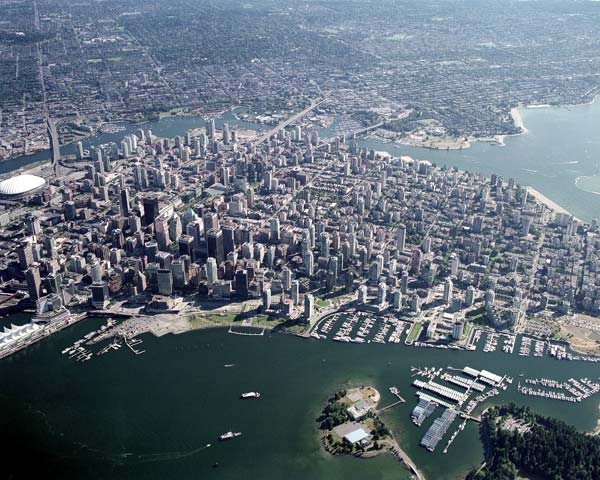criticisms no laughing matter

Vancouver should sit up, take notice
Criticisms of the city's downtown core in The Economist are no laughing matter as we approach the 2010 Winter Games
The Vancouver Sun
Monday, July 17, 2006
By Miro Cernetig
Vancouverites never miss reading, or at the very least boasting about, any edition of The Economist designating their city as the best on the planet in which to live.
So maybe we ought to pay equally close attention when the world's most prestigious magazine -- and probably the one that's only truly read on a global basis -- takes pains to offer a wakeup call to Vancouver, now undergoing the biggest population and development boom in its history.
The Economist's latest dispatch about our charmed city by the Pacific has this somewhat sobering title: "A great city more troubled than it's cracked up to be."
It's not an entirely scathing article. We're hardly headed to the bottom of The Economist's livability ratings, occupied by such spots as Tehran and Algiers, unless urban planners do a lot of things wrong in the years to come.
"It regularly tops surveys of the world's most livable cities," the magazine says of the city. "Vancouver's combination of natural beauty and urban sophistication has drawn expatriates from far and wide."
Still, the article isn't anything the boosters at the tourism board are going to be writing home about, either. In fact, the theme is that Vancouver is a city at the crossroads, experiencing the growing pains of its success and quite possibly lacking a coherent plan to save itself from its phenomenal growth.
The big problems aren't in the suburbs, though the magazine wonders whether planners are going to encourage urban sprawl with their current push for $3 billion in bigger highways, rather than more rapid transit, that will bring more cars into the city's core.
What The Economist worries about is the quality of life in Vancouver's very epicentre, usually applauded for those magnificent beaches and architectural triumphs such as Coal Harbour's glass towers and Arthur Erickson's waterfall over Granville Square concrete.
". . . it is the once pleasant downtown that causes most alarm," it warns. "Homeless panhandlers yell at theatre goers, while young addicts deal drugs on street corners. They spill out from the Downtown Eastside, an area of decrepit boarding houses, sleazy bars and boarded up shops infamous for the country's highest rate of poverty and drug addiction. Its ills have resisted decades of government effort."
It might be tempting to call this an overheated exaggeration from a visitor. Vancouver's downtown is hardly a walk through an American ghetto. Yet others, particularly those who have seen the city grow over the last few decades, have noted The Economist's critique and concurred.
"Just Thursday night I drove past the corner of Georgia and Granville -- the very heart of the city -- and saw a couple of homeless people bedding down for the night outside Pacific Centre, the city's ritziest mall," Ian Haysom, a former editor-in-chief of The Vancouver Sun wrote in his column in the Victoria Times Colonist. "It shocked a visitor to Vancouver who was driving with me. Me? I'm not shocked by anything here any more . . . .
"The city, if we continue on this course, will be a haven for the very, very rich and the desperately poor, coexisting in an unlikely metropolis of Guccis and gutter-dwellers."
The Economist also isn't optimistic that the city has yet come up with the solutions to these challenges. It says rookie Mayor Sam Sullivan's "most promising scheme is an attempt to rein in sprawl by increasing housing density in central areas. But on the crucial issues of drugs and crime, he has made little progress."
Should we worry about what The Economist thinks?
Well, yes. As the 2010 Olympics approach, this is just a first glimpse of the unflinching critical eye Vancouver will be getting from the Economist Intelligence Unit, the analysts who rank 127 cities each year for the magazine.
And while no journalism is infallible, The Economist is an institution that often sets the agenda and has an ability to attach labels to people and places that stick. Just ask former Prime Minister Paul Martin, whom the magazine christened Mr. Dithers, a moniker that haunted him all the way to defeat.
-30-
Magazine says council must clean up Downtown Eastside
Vancouver Sun
Thursday, July 13, 2006
by Emily Chung
Vancouver is a troubled city where "homeless panhandlers yell at theatre-goers, while young addicts deal drugs on street corners," says The Economist magazine.
Last year, Vancouver was ranked the most livable city in the world for the fourth year in a row by the Economist Intelligence Unit, a branch of the same company that owns the weekly magazine.
The influential magazine focuses on international politics and business news and opinion.
In November, the Economist Intelligence Unit, which analyses countries' livability and their business environments, also ranked Vancouver as the top city to do business in out of a list of 100.
But the magazine's July 8 -14 issue says although the city may top surveys, "some ordinary Vancouverites wonder whether their increasingly gritty city is worthy of all the accolades."
The article says Vancouver's high housing costs produce traffic congestion by forcing families to the suburbs.
But most of its attention focuses on the "once-pleasant downtown" and the troubles caused by the Downtown Eastside's high rate of poverty and drug addiction.
"If Vancouver is to continue to live up to its reputation as an urban paradise, it will need a city government with the power, as well as the will, to keep it that way," the article warns.
-30-

0 Comments:
Post a Comment
<< Home